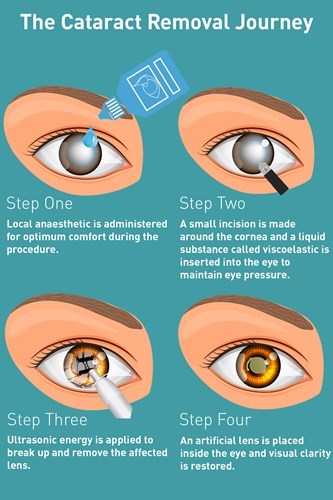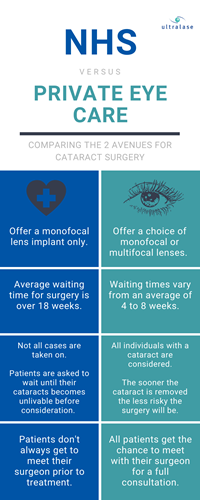How Much Does Cataract Surgery Cost in the UK?
25 February 2020

Cataract surgery is the most common procedure in the world...
with a reported 400,000 treatments carried out per year by the NHS, in the UK alone. This statistic skyrockets to over 20 million, with all cases from across the world taken into account.
Shockingly, cataracts are accountable for a staggering 50% of the world’s avoidable blindness. And that’s exactly what it is- avoidable!
Many people don’t realise that a cataract develops very slowly and can go undetected for long periods of time. This is why it’s important to attend regular eye tests; even if there have been no noticeable changes to vision.
In this article we explore:
- What a cataract is
- Cataract surgery
- The average cost of cataract surgery in the UK
- The key differences between NHS and private cataract surgery
- The symptoms of a cataract
- Recovery and prevention
What is a cataract?
A Cataract is a gradual condition, in which the eye’s lens begins to cloud. It’s primarily caused by age; often beginning with no symptoms at all, until it develops and impairs vision.
People who suffer with cataracts describe the condition as if constantly looking through frosted glass. It largely affects individuals over 65 years of age and can only be treated with surgery.
So, what is happening inside the eye? A cataract occurs when proteins and tissues within the lens break down and begin to ‘clump’. As these clumps start to accumulate and become dense, they start to darken and cause the clouding.
How is a cataract removed?
Cataract surgery is one of the safest and most common procedures in the world; with an average satisfaction rate of over 95%.
Also known as lens replacement surgery; experienced surgeons can treat one eye in less than ten minutes! This time increases with the severity of the cataract, which is why we advise patients to have their cataract removed sooner rather than later.
Surgery is completed under local anaesthetic, allowing for optimum comfort throughout treatment. Feedback from the majority of patients reports that lens replacement surgery is pain free.
During the procedure, patients eye will be gently held open and instructed to focus on three lights– it’s really as simple as that!
The infected lens is carefully removed via ultrasound and an artificial lens is then placed inside the eye. Contrary to popular belief, the lens cannot be felt inside the eye after surgery and will not need to be removed or replaced.
Once the lens implant is in place, a protective eye patch is provided and the patient will be escorted to a recovery room.
What is the cost of cataract surgery in the UK?
The cost of cataract surgery in the UK varies; however the average cost per eye typically stands at £3000 - £4000. Of course this depends on the type of lens inserted during treatment- we explain more about this further down.
Many vision correction specialists set their prices depending on the patient’s prescription. This means that those with a high prescription will pay a substantially higher price for the same procedure, compared to those who have a low prescription.
Another factor adding to the equation is the type of lens implant chosen for treatment. Monofocal lenses tend to be slightly cheaper than multifocal lenses. For example, Ultralase charge a fixed price of £2495 for a monofocal lens implant and a fixed price of £3245 for a multifocal lens implant.
Monofocal lens implants correct one focal point; meaning that patients will need glasses for certain activities. Whereas, multifocal lens implants provide visual clarity at all distances, allowing for complete freedom from glasses.
Can you pay monthly for cataract surgery?
Yes, you can choose to take out a financial plan with your preferred eye care specialist and pay for your cataract surgery in digestible monthly instalments. Of course this will vary.
The majority of clinics will ask for a minimum deposit of £500-£1000. After this, monthly payments will depend on the length of time the plan has been taken out for.
Additionally, most private clinics offer interest-free credit.

Private vs NHS cataract removal
Choosing whether to go with the NHS or a private eye care specialist for cataract surgery doesn’t need to be a headache.
One of the key differences we’d like to bring to your attention, and one many of our patients find significant, is that the NHS can only offer cataract removal patients a monofocal lens implant.
This means that for those who desire complete independence from glasses, having treatment in a private clinic, with the use of a multifocal lens, may be a better option.
Take a look here at some of the key differences between NHS and private cataract surgery…
What are the symptoms of a cataract?
A cataract develops gradually and worsens over time. The dangerous thing about this is that sufferers may not even know that they have a cataract until it begins to impair vision. This is why we urge everyone to attend a bi-yearly or yearly eye test; even if there have been no obvious changes to vision.
Symptoms of cataract include:
- Cloudy or blurry vision
- Decreased sensitivity to colour distinction
- Difficulty with vision at night
- Sensitivity to light and glare
- Seeing halos around lights
- Frequent changes in prescription
- Double vision
How long does it take to recover from cataract surgery?
Recovery from cataract surgery is surprisingly quick. Most patients take 3-5 days off work, depending on the nature of their occupation.
Here are a few considerations to bear in mind when in recovery:
- Driving must only commence once a registration plate can be read from 20 feet away- this usually takes two to three days.
- It’s important to use the eye drops provided by the surgeon exactly as instructed (usually every day for four weeks).
- Ensure eyes are protected from light; as you can imagine, they will be much more sensitive than usual. Wearing sunglasses for a few days following surgery is recommended.
- It is imperative that ALL aftercare appointments are attended, as instructed by the clinic. Once the surgeon is happy with your results, you will be discharged.
Can I prevent developing a cataract?
A cataract cannot be prevented as such; however there are measures you can take to delay one from forming. These include:
- Wearing sunglasses when out in the sun.
- Quitting smoking. Kicking this habit will have several benefits to your eye health- as well as your overall health.
- Eat a balanced and healthy diet. Eat plenty of fruits and vegetables; spinach, kale, and spring greens are superfoods for the eyes. You can read up on the nutrients that will help to keep your eyes happy here.
Back to Blog
